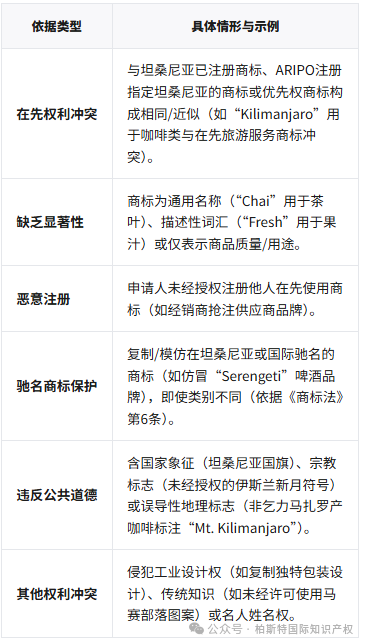- Knowledge
Preface:
The trademark opposition system in Tanzania is the core mechanism for protecting trademark rights, and the legal framework is based on the Trade Marks Act No. 26 of 2016andTrademark RegulationsBased on, byThe Business Registration and Licensing Agency (BRELA) leads the execution. The following is a systematic analysis of the system from five dimensions:
1、 Trademark opposition acceptance agency
The Business Registration and Licensing Authority (BRELA) is the statutory authority for trademark objections in Tanzania, under the Ministry of Industry and Trade. Its main functions include:
1. Review and Announcement:
Conduct formal examination (document compliance) and substantive examination (distinctiveness, prior rights conflict) on trademark applications.
The trademark that has passed the examination shall be published in the Tanzania Trademarks Journal, and the opposition period shall be calculated from the date of publication.
2. Jurisdiction over Objection Cases:
Receive objection applications, review legal basis, coordinate evidence exchange between both parties, and make administrative rulings.
3. Proxy requirements:
Foreign objectors must entrust a locally registered trademark agent in Tanzania to submit the application (in accordance with Article 12 of the Trademark Law).
Tanzanian residents or businesses can submit their own cases, but it is recommended to entrust professional agents for complex cases.
Practical tips:BRELA requires objection documents to be in English or Swahili, and non official language materials must submit certified translations.
2、 Timing of Trademark Objection
The exercise of the right of objection is subject to strict time limits, and the specific rules are as follows:
1. Announcement period calculation:
After the trademark announcement, the objector shall submit an objection application within 60 days (calculated from the date of announcement), and any delay shall be deemed as a waiver of the right to object.
2. Extension application:
Tanzania does not allow extensions, and dissenters must strictly complete their applications within 60 days.
3. Consequences of overdue:
Trademarks that are not objected to in a timely manner will be allowed to be registered, and the objector can only protect their rights through the invalidation procedure (applying to BRELA) or court litigation (filing a lawsuit with the commercial court), which increases the cost by about 3-5 times.
Monitoring suggestion:Subscribe to trademark bulletin updates through the BRELA official website or use the trademark monitoring service of the African Regional Intellectual Property Organization (ARIPO).
3、 Basis for Trademark Objection Application
Objections must be based on statutory reasons such as Articles 14, 15, and 16 of the Trademark Law, and the core basis includes:

Key points of evidence:Tanzania trademark registration certificate, sales contract, advertising materials, market research report, etc. need to be submitted to prove the possibility of confusion or malice.
4、 Trademark opposition process
The objection procedure is divided into four stages, led by BRELA:
1. Submit objection application (stage 1-2 months)
The objector shall submit the TM-03 form (objection notice), detailed reasons and evidence, and pay the official fee (approximately $100).
2. BRELA formal review (stage 2-3 months)
BRELA reviews the integrity of the documents and requires a deadline of 30 days for correction. Failure to do so will result in the withdrawal of the objection.
3. Respondent's defense (stage 3-6 months)
The objector must submit the TM-06 form (defense statement) and counter evidence within 90 days, and BRELA may extend the deadline by 30 days at its discretion.
4. Written review and ruling (stage 6-15 months)
BRELA typically makes decisions based on written materials, and in complex cases, hearings may be held (requiring both parties to apply and pay fees). The ruling results include:
Objection established: The trademark application is rejected, and the objector may appeal to the commercial court.
Objection not established: Upon approval of registration, the objector may file an administrative lawsuit with the commercial court.
Relief mechanism:The losing party needs to file a lawsuit with the commercial court within 60 days after the ruling, and the litigation process takes an average of 2-3 years.
5、 Trademark opposition period
The average duration of the objection procedure is 12-18 months, with key variables including:
1. Standard process duration:
Announcement period (60 days) → Defense period (90 days) → BRELA ruling (6-12 months)
2. Extended cycle factors:
Overseas evidence requires Hague authentication or authentication by the Tanzanian embassy or consulate, with an additional 1-3 months;
Both parties apply for a hearing (extended by 2-4 months);
The efficiency of handling BRELA cases is relatively low (with an average delay rate of 30% in 2023).
Judicial litigation stage: If entering commercial court proceedings, an additional 2-5 years will be added.
3. Institutional challenges:
Lack of electronic system: BRELA relies on paper document circulation, which can cause delays in the process.
The threshold for protecting traditional knowledge is high: official authorization documents from the tribe are required, making it difficult to provide evidence.
Practical strategies and regional collaboration
Enterprises should pay attention to the objection system in Tanzania:
Priority registration:Designate Tanzania through the Madrid System or use ARIPO regional registration (with separate confirmation of territorial extension).
Localization of evidence:Retain sales records in Tanzania (such as invoices stamped by tax authorities), local media advertisements (such as trademark usage certificates published in Daily News).
Regional linkage:Monitor ARIPO announcements (if the objection period is only 3 months) and simultaneously prevent regional registration risks.
Tanzania is promoting intellectual property coordination under the framework of the African Continental Free Trade Area Agreement (AfCFTA), and may simplify the objection process in the future. Companies need to pay attention to BRELA policy developments.




